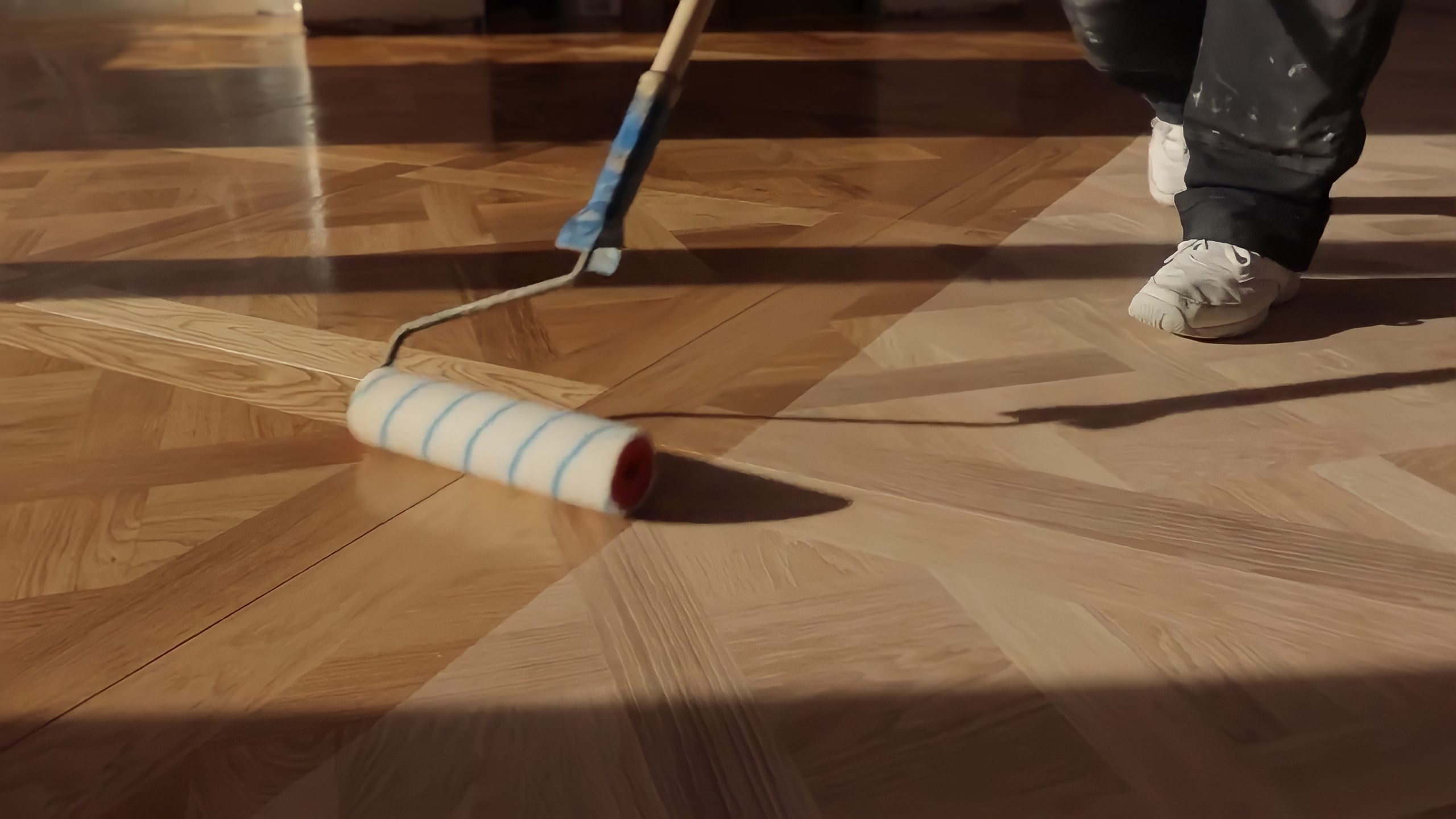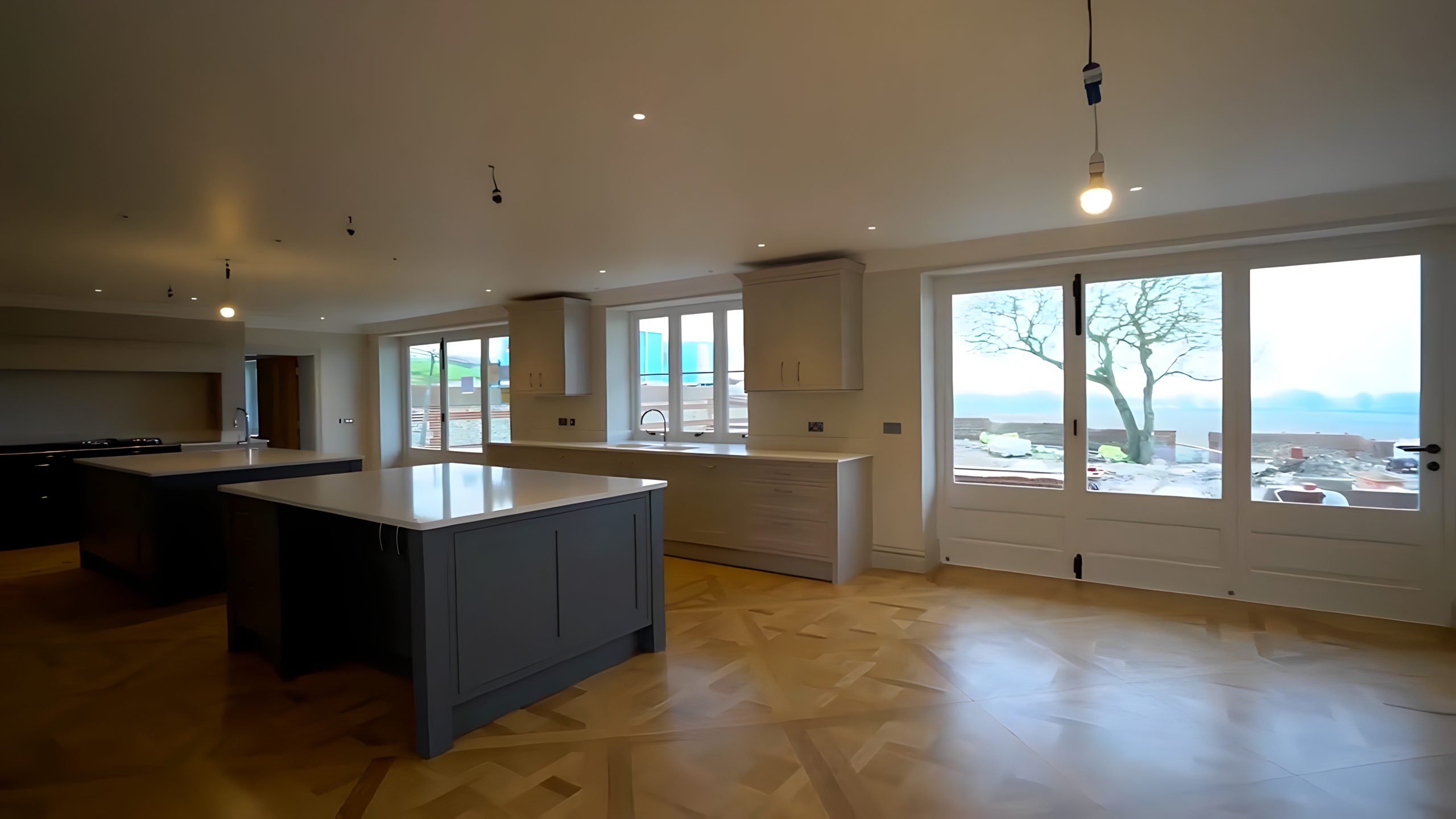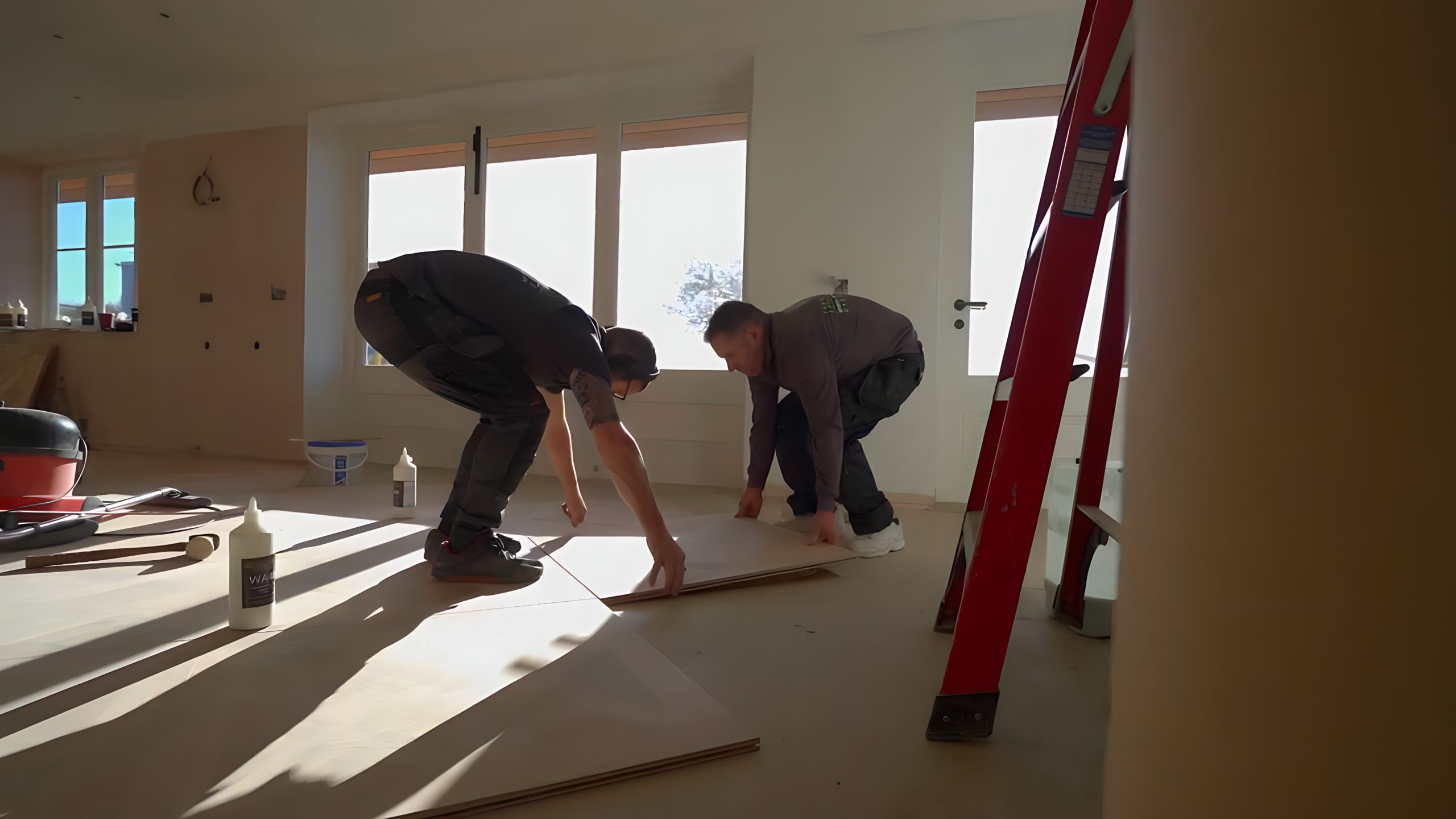Curious about the cost of hardwood floors in 2025? This guide covers everything you need to know, from material prices to installation fees and extra costs.
Key Takeaways
- The cost of hardwood flooring in 2025 varies by type: solid hardwood averages over £80/m², engineered hardwood around £50/m², and laminate about £30/m².
- Factors influencing hardwood floor prices include wood species, quality and grade, and installation methods, all significantly impacting the overall budget.
- Maintaining hardwood floors is crucial for longevity, with regular upkeep costs ranging from £42/m² for sanding to £30-50/hour for restoration work.
Cost of Hardwood Floors in 2025
The cost of hardwood floors in 2025 is influenced by numerous factors. On average, the price of wooden flooring varies significantly depending on the type of flooring you choose.
Solid hardwood flooring typically costs over £80 per square meter, while engineered hardwood is more budget-friendly at around £50 per square meter. For those looking for a more affordable option, laminate flooring offers a viable alternative at approximately £30 per square meter.
Each type of flooring types has its own set of benefits and cost considerations, which we’ll explore in the next sections.
Solid Hardwood Flooring Costs
Solid hardwood flooring is renowned for its durability and timeless appeal. However, this luxury comes with a price. The cost of solid wood flooring can vary significantly based on the species of wood chosen. Common species like oak are generally more affordable, whereas exotic woods like Brazilian cherry command a higher price due to their rarity and unique properties.
In addition to species, the grade of the wood plays a crucial role in determining costs. Wood flooring types are categorised into different grades such as:
- Prime
- Classic
- Character
- Rustic
Higher-grade wood, which has fewer knots and imperfections, is more expensive but offers a cleaner, more uniform look. Understanding these variations can help homeowners make informed decisions that balance aesthetics with budget considerations.
When planning your wooden flooring project, consider the overall cost, which includes not just the material but also the installation costs. On average, installation can range from £35 to £60 per square meter, depending on the complexity of the job and the expertise required. This makes solid hardwood a significant investment but one that adds lasting value to your home, especially when considering wood flooring costs.
Engineered Hardwood Flooring Costs
Engineered hardwood flooring presents a more affordable alternative to solid wood while still offering the beauty of real wood. Engineered wood flooring typically costs around £50 per square meter, making it a cost-effective choice for many homeowners. Unlike solid hardwood, engineered wood is composed of multiple layers of wood, which enhances its stability and resistance to moisture, making it suitable for areas where solid wood might not be ideal.
The construction of engineered hardwood involves a top layer of real wood veneer over several layers of plywood or high-density fiberboard. This structure not only reduces the overall material costs but also makes the flooring more versatile and easier to install.
While it may not match the longevity of solid hardwood, engineered wood provides a robust and attractive flooring solution at a more manageable price point.
Laminate Flooring as an Alternative
For those seeking the look of hardwood floors without the hefty price tag, laminate flooring offers a compelling alternative. Priced at around £30 per square meter, laminate is a budget-friendly option that can mimic the appearance of wood or tile. Laminate flooring is made of a photographic layer that replicates the look of wood, sealed under a protective layer to enhance durability.
However, it’s important to note that while laminate flooring is more affordable, it doesn’t offer the same durability as solid or engineered hardwood. Laminate is less resistant to wear and tear and cannot be refinished like real wood flooring.
Despite these drawbacks, laminate remains an increasingly popular choice for homeowners looking to achieve a stylish look without stretching their budget, and it is also an eco friendly option.
Factors Influencing Hardwood Floor Prices
Several factors affecting the overall cost of hardwood flooring projects. These include the type of wood species, the quality and grade of the wood, and the chosen installation method. Each of these elements can significantly impact your budget, so it’s essential to understand how they interact and contribute to the final cost of your new flooring.
Type of Wood Species
The species of wood you choose for your flooring plays a major role in determining the cost. Common hardwood species like red oak are generally more affordable compared to exotic woods such as Brazilian cherry or teak, which can significantly increase material costs due to their rarity and high demand. Exotic woods not only come with a higher price tag but also offer unique aesthetics and properties that can add a luxurious touch to your home.
Different wood species also vary based on durability and appearance. While more common woods like oak and maple provide a classic and durable option, exotic species can offer unique grain patterns and colours that stand out. Understanding these differences can help you make a choice that fits both your aesthetic preferences and your budget.
Quality and Grade of Wood
The quality and grade of the wood you select for your flooring project will also affect the overall cost. Higher-grade woods, such as select or prime grades, offer superior appearance and durability compared to lower-grade options like common or rustic grades. These higher-grade woods typically have fewer knots and imperfections, resulting in a cleaner, more uniform look that is desirable but more expensive.
Choosing a higher wood grade can significantly enhance the aesthetics and performance of your flooring, but it’s important to consider the increased costs associated with these premium options. Homeowners should weigh the benefits of a higher-grade wood against their budget to find the best balance between quality and cost.
Installation Method
The method you choose for wood flooring installation can have a substantial impact on the overall cost of your project. Common installation methods for hardwood flooring include nail-down, glue-down, and floating installations. Each method comes with its own set of costs and complexities. For instance, nail-down installations are typically more labour-intensive and may require additional preparation of the subfloor, leading to higher costs.
On the other hand, floating installations are generally easier and quicker to perform, often resulting in lower labour costs. The choice of installation method should align with your budget constraints and the specific requirements of your flooring project to ensure the best outcome.
Additional Costs in Hardwood Flooring Projects
Beyond the basic costs of materials and installation, several additional installation costs can arise in hardwood flooring projects. These include preparation and subfloor work, finishing and sealing, and the cost of accessories and trim.
Understanding these potential extra costs can help you plan your budget more accurately and avoid unexpected surprises.
Preparation and Subfloor Work
Preparing the subfloor is a critical step in wood flooring installation that can add to your project’s overall cost. If the subfloor is in poor condition, it may require extensive preparation work, such as levelling or repairing damage, which can significantly increase the total cost. On average, preparing the subfloor can incur costs ranging from £10 to £20 per square meter.
Additionally, removing old flooring can add to the expenses. This process typically costs around £6 per square meter but is essential for ensuring a smooth installation of your new hardwood floors.
Proper subfloor preparation is vital for the longevity and performance of your hardwood flooring, making it a worthwhile investment.
Finishing and Sealing
Finishing and sealing your hardwood floors is another important consideration that can affect the overall project cost. This process includes various methods such as sanding, staining, and applying varnish, with costs ranging from approximately £4 to £25 per square meter depending on the chosen method. These finishing touches not only enhance the appearance of your floors but also increase their durability and longevity.
Hiring an experienced floor fitter for finishing and sealing is recommended to ensure a high-quality result. Although this adds to the costs, it guarantees that the flooring will look its best and stand the test of time.
Accessories and Trim
In addition to the main flooring materials, accessories and trim can add to the total cost of your hardwood flooring project. Items such as mouldings, trims, and skirting boards are essential for achieving a polished, professional look. The costs for these accessories can vary widely based on the style and materials chosen.
For instance, basic skirting boards for an average-sized room can start around £200, but more elaborate or custom designs will increase the price. These finishing touches are crucial for completing the look of your hardwood floors and ensuring that every detail is perfect.
Comparing DIY vs Professional Installation
When it comes to installing hardwood floors, homeowners often face the decision of whether to install hardwood floors themselves or hire professionals. This choice depends on factors such as budget, personal skills, and the complexity of the job.
Both DIY and professional installations have their pros and cons, which we’ll explore in more detail based on personal preference.
DIY Hardwood Floor Installation Costs
Opting for a DIY installation can save on labour costs, but it requires a significant investment of time consuming effort. DIY installations can be challenging, especially for those without prior experience or the necessary tools. Mistakes during installation can lead to long-term issues such as gaps, warping, and moisture problems, which may end up costing more to fix in the long run.
Different installation techniques, such as nail-down, glue-down, or floating methods, can result in varying levels of difficulty and labour costs. Floating installations, for example, tend to have lower labour costs as they are easier to perform compared to nail-down methods.
Homeowners considering a DIY approach should carefully assess their highly skilled skills and the complexity of the project complexity before most homeowners proceed.
Professional Installation Costs
Hiring professional installers for your hardwood flooring project ensures high-quality results and can save you from potential headaches down the line. Professional installation costs for solid hardwood flooring typically range between £35 and £60 per square meter. This cost often includes additional services that enhance the overall quality and aesthetic of the flooring.
While professional installation may be more expensive upfront, it offers peace of mind and guarantees that the job is done correctly. Professionals bring expertise and efficiency to the project, ensuring that your new floors are installed to the highest standards.
Estimating Your Hardwood Flooring Project
Estimating the total cost of a hardwood flooring project involves accounting for various factors, including materials, labour, and any additional expenses that may arise. Using tools like cost calculators and obtaining detailed quotes from professionals can help you create a more accurate budget for your project.
Using a Hardwood Flooring Cost Calculator
A hardwood flooring cost calculator is a valuable tool for estimating the overall price of new flooring. These calculators take into account factors such as the size of the area to be covered, the type of wood flooring chosen, and additional costs like installation and finishing. Inputting these details gives homeowners a clear picture of the potential costs involved in their flooring project.
Cost calculators can also help DIY enthusiasts estimate material costs alone by omitting the installation section. This allows for a focused assessment of the costs associated with the flooring materials themselves.
Utilising a lower cost calculator is an efficient way to plan your budget and avoid unexpected expenses.
Maintenance and Longevity of Hardwood Floors
Maintaining hardwood floors is essential for preserving their beauty and extending their lifespan. Regular upkeep not only keeps your floors looking their best but also protects your investment in the long run. A damp cloth can be used for cleaning to ensure your hardwood remains in top condition.
Understanding the maintenance requirements and associated costs can help homeowners plan for the long-term care of their hardwood flooring.
Regular Maintenance Costs
Regular maintenance tasks for hardwood floors can incur costs that need to be budgeted for. Sanding and refinishing hardwood floors, for example, typically costs around £42 per square meter. Additionally, hiring a tradesperson for wood floor restoration can cost between £30 and £50 per hour. These costs are essential for preserving the beauty and longevity of your hardwood floors, ensuring they remain a valuable part of your home.
Routine tasks such as regular sweeping and occasional mopping are also necessary to maintain the floors’ appearance and prevent damage. Proper care and maintenance not only extend the lifespan of hardwood floors but also result in long-term cost savings by reducing the need for extensive repairs or replacements.
Lifespan and Durability
One of the key benefits of hardwood floors is their remarkable lifespan. Solid hardwood flooring can last anywhere from 30 to over 100 years, largely depending on the type of wood and the maintenance it receives. With proper care, hardwood floors can remain a durable and beautiful part of your home for several decades, making them a sound long-term investment.
Effective maintenance practices, such as applying a protective finish and promptly addressing any damage, ensure that hardwood floors retain their timeless elegance and lasting durability. This longevity makes hardwood flooring a preferred choice for homeowners looking to enhance both the aesthetic and value of their homes.
Enhancing Home Value with Hardwood Floors
Hardwood flooring is not just an aesthetic upgrade; it’s an investment that can significantly enhance your home’s value. Potential buyers often view hardwood floors as a desirable feature, appreciating their quality and timeless beauty.
Installing hardwood floors can elevate your home’s market appeal, making it more attractive to prospective buyers and potentially increasing its resale value.
Resale Value Impact
Homes featuring hardwood flooring often sell at a higher price compared to those with other types of flooring. Properties with hardwood floors that require refinishing can see an increase in value by 3-5%, according to real estate surveys. This makes hardwood floors a smart investment for homeowners looking to boost their property’s resale value.
Additionally, homes with hardwood floors typically sell for a higher price per square foot compared to those with carpet or other flooring options. The timeless elegance and durability of hardwood floors make them a sought-after feature that can set your home apart in the competitive real estate market, especially when considering the square footage.
Aesthetic Appeal and Market Trends
The aesthetic appeal of hardwood floors is undeniable. Homeowners are increasingly favouring hardwood floors for their visual warmth and timeless style. Current trends in hardwood flooring include wide planks and eco-friendly materials, reflecting a shift towards sustainable and visually appealing choices.
The natural beauty and durability of hardwood floors make them an attractive option for high-traffic areas in the home. Their ability to blend seamlessly with various interior design styles ensures that wood floors remain a popular choice among homeowners looking to enhance their living spaces with timeless elegance.
Summary
In conclusion, hardwood flooring offers a blend of beauty, durability, and value that can enhance any home. Understanding the costs involved, from material options to installation methods and additional expenses, is crucial for planning a successful hardwood flooring project. Whether you choose solid, engineered, or laminate flooring, each option has its own set of benefits and considerations. By making informed decisions and maintaining your floors properly, you can enjoy the lasting elegance and increased home value that hardwood floors provide. Ready to transform your space? Let’s make those hardwood flooring dreams a reality!
Frequently Asked Questions
What is the average cost of solid hardwood flooring in 2025?
The average cost of solid hardwood flooring in 2025 is expected to be over £80 per square meter. This provides a valuable insight for budgeting your flooring project.
How much does it cost to install engineered hardwood flooring?
Installing engineered hardwood flooring typically costs around £50 per square meter, offering a cost-effective alternative to solid hardwood options.
What are the additional costs involved in a hardwood flooring project?
When planning a hardwood flooring project, anticipate additional costs such as subfloor preparation, finishing and sealing, and necessary accessories like mouldings and trims, which can vary based on current conditions and preferred finishes. These factors are essential for a successful installation and should be included in your budget.
Should I choose DIY or professional installation for my hardwood floors?
Choosing professional installation for hardwood floors often results in higher quality and results, particularly if the project is complex. If you have the necessary skills and confidence, DIY can be a cost-effective option, but be prepared for the additional effort involved.
How does hardwood flooring impact the resale value of a home?
Hardwood flooring can greatly increase your home’s resale value, making it more attractive to potential buyers and often leading to a higher selling price. Investing in hardwood floors is a smart choice for maximising your property’s worth.









